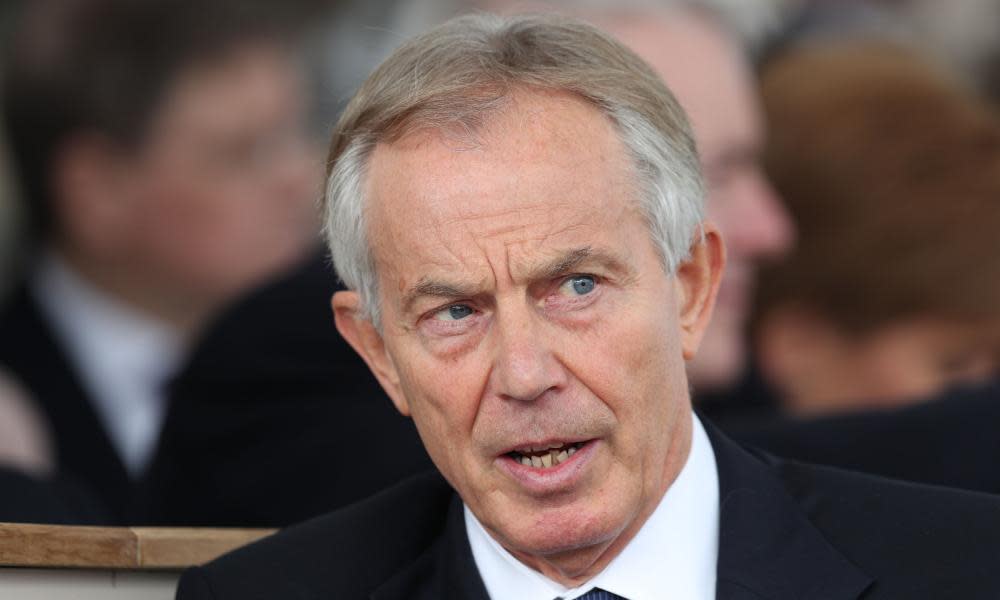Tony Blair says he expects Theresa May to be next prime minister

Tony Blair has said that he expects Theresa May to be the next prime minister, arguing that the best argument to vote for Labour is to provide a strong opposition.
The former prime minister, who has been a vocal critic of Jeremy Corbyn, refused again to say that the Labour leader would be the best prime minister. He said that the real issue in the campaign was not who was going to be prime minister but making sure the government was held to account over Brexit.
Asked if he was saying “hand on heart” that Corbyn would be the best prime minister, Blair told Sky News: “If the polls are right, we know who’s going to be prime minister on 9 June. That’s not the issue. It’ll be Theresa May if the polls are right...
“I think the most powerful argument for Labour in this election because of the way the polls are, and the way the opinion polls are and the leadership issue, the most powerful argument for Labour is to say it’s important for our democracy that the government is held to account and needs a strong opposition.”
Blair has previously insisted he is not advocating tactical voting but sailed close to the wind in arguing that people should vote for candidates keeping an open mind on stopping a hard Brexit.
There have been calls for Labour to discipline Blair for suggesting people should think about voting for other parties’ candidates.
But his argument about voting Labour for a strong opposition to May has been adopted by an increasing number of Labour MPs trying to save their seats in the face of worrying polling and concerns among centrists in the party that a heavy defeat could tip the balance of power towards supporters of Corbyn.
Ben Bradshaw, the Labour MP for Exeter, made the case to Devon voters in his local newspaper that they should vote for him knowing it would not affect who runs the government. “Supporting me in Exeter will not affect who governs nationally,” he said.
Wes Streeting, a Labour MP who has one of the smallest majorities in the country in Ilford North, has stressed he will be an “independent-minded MP”, in contrast to his Tory opponent who will be a “government loyalist who will just parrot Theresa May”.
Chuka Umunna, Labour MP for Streatham, has also departed from party policy on the EU in saying he would campaign for on a platform of “fighting for the UK to stay in the single market and the customs union”.
Despite some MPs distancing themselves from Corbyn’s leadership during the campaign, an analysis of the makeup of the parliamentary party suggests his leftwing project has a good chance of surviving even if his leadership comes to an end at some point in the next parliament.
Calculations by Prof Tim Bale and David Jeffery from Queen Mary’s University of London found that the 23 MPs who backed Corbyn in last summer’s leadership battle have larger majorities on average than the typical Labour MP.
It showed that the average majority of a Corbyn-supporting MP was 12,770, while the average of non-Corbyn supporting MPs was 10,256, suggesting that there was more chance of leftwing MPs keeping their seats at the election.
Many within Labour have already turned their minds to the makeup of the parliamentary party after the 8 June election, with a battle for seats currently under way.
Allies of Corbyn have long been thinking about a potential succession plan to ensure the leadership of the party remains firmly on the left even if their leader decides to step down in future.
There will be an attempt to change the leadership contest rules at next September’s party conference by lowering the number of supportive MPs and MEPs needed for a candidate to get on the ballot from 15% to 5% of the total. However, the election makes it possible that a leftwing successor to Corbyn may not need to have the threshold lowered to 5%.
Bale and Jeffrey worked out that if there was a catastrophic loss of seats for Labour and it ended up with about 150, candidates for the leadership would only need about 23 supportive MPs.
There are currently about 23 MPs who were loyal to Corbyn at the last leadership election, only one of whom is seriously at risk of losing her seat: Cat Smith in Lancaster Fleetwood.
The academics said a leftwing successor would probably fall just short of the required 15% of MPs as they are currently constituted, but the balance of power could change depending on new MPs entering the House of Commons.
There are 12 Labour MPs stepping down. Emma Hardy, a Unite member and ex-teacher, is the candidate to succeed Alan Johnson in Hull West and Hessle, while Ellie Reeves, the wife of Labour parliamentary chair John Cryer, is to stand in Lewisham West and Penge.
In a blog, Bale and Jeffrey said: “This does indeed mean that literally a handful of new MPs could determine who leads the Labour party after the election – either by lending the left sufficient numbers to nominate one of their own under the existing 15% threshold or, in refusing to do so, by making it essential that Corbyn cling on and the left achieve a reduction in that threshold.
“Hence the manoeuvring now going on to parachute preferred candidates into supposedly safe seats. And hence why we should all be watching who makes it on to the Labour benches after 8 June very carefully indeed.”
Women have been selected as Labour candidates at least four seats so far amid worries that 43% of those in marginal seats are female MPs. This is around the same proportion of Labour MPs overall but efforts are under way to ensure the gender balance of the parliamentary party does not go backwards.

 Yahoo News
Yahoo News 
